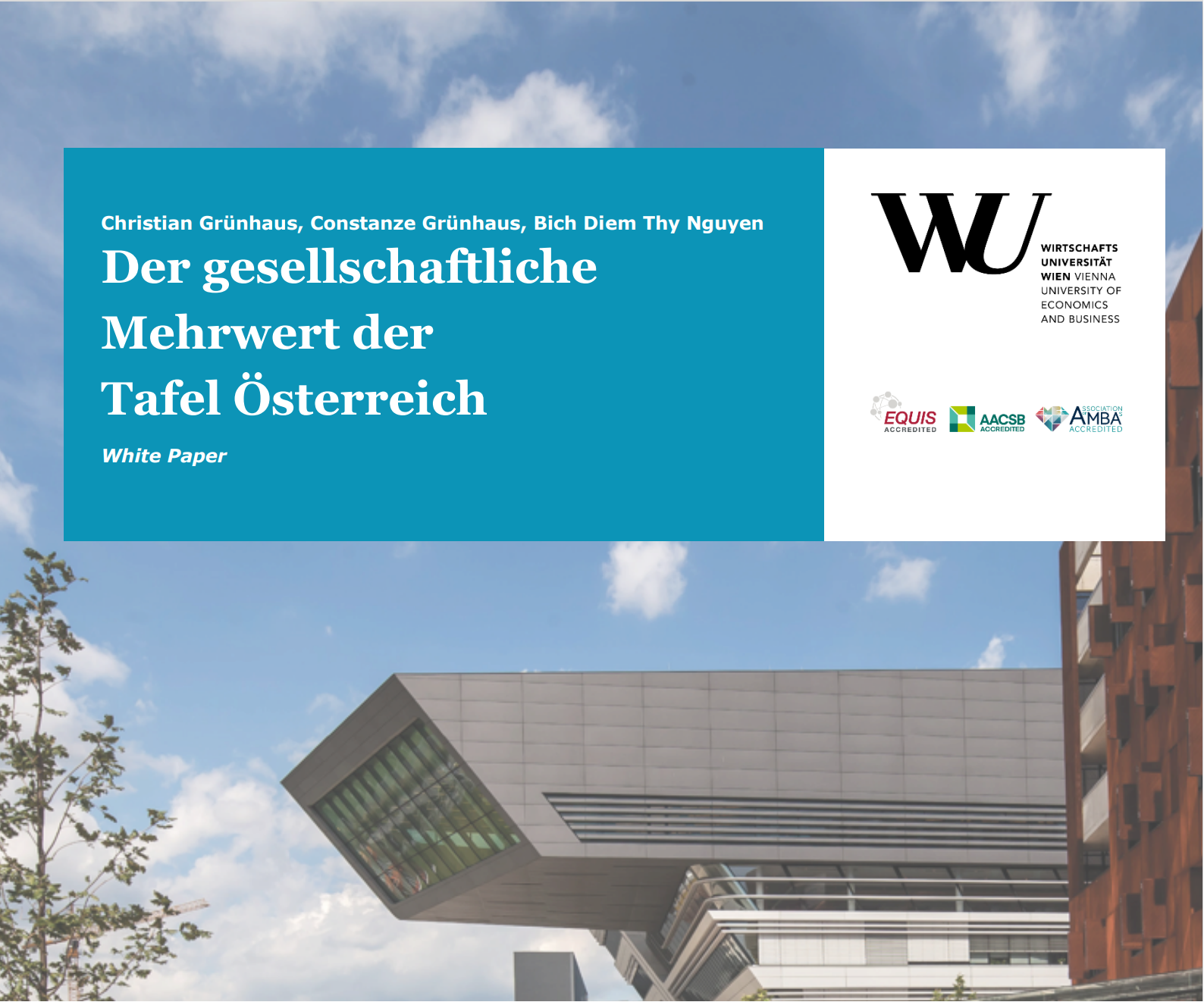More than 1.5 million people in Austria are at risk of poverty, food insecurity, or social exclusion. Due to inflation, the percentage of those who are materially and socially deprived is increasing. An impact analysis by the NPO Competence Center at the University of Economics (Wirtschaftsuniversität WU) in Vienna now reveals the social and economic value of Die Tafel Österreich‘s work. The study analysed how exactly this food assistance works and what social value it provides, not only in terms of material support but also in addressing the social aspects of poverty. Based on an impact model, the study investigated the societal value of Die Tafel Österreich for the two central groups, social institutions (“charities”) and individuals at risk of poverty, and empirically examined their effects. Read the original document here.
Growing Gap: Two-Tier Society in Food Access?
Approximately 17.5% of Austria’s population (1,550,000 people) are at risk of poverty or social exclusion, with 14.8% being at risk of poverty, meaning their income falls below the defined poverty threshold. The figures regarding significant material deprivation have worsened recently, primarily due to inflation and rising costs (from 1.8% in 2021 to 2.3% in 2022, according to Statistik Austria).
Food assistance plays a significant role in fighting poverty. They often buy inexpensive food like pasta or rice, making access to fresh fruits and vegetables a crucial distinguishing factor in the eating habits of different income groups, according to studies. This can have severe health consequences, and food also plays a vital social role. Social participation is often associated with the cost of food and beverages.
Study Findings: Food Assistance Is More Than Just Food
The international Tafel model, which Die Tafel Österreich has followed since 25 years and hence from the beginning, involves the distribution of food not directly to people at risk of poverty but through social institutions. These institutions provide professionally guided ways out of poverty for those affected. Therefore, Tafel and social institutions work synergistically. The WU analysis examined the effects on both groups.
Individuals at risk of poverty gain access to food, warm meals, or a larger and more diverse selection of fresh products like fruits and vegetables. This allows them to save money that they can use for other essential expenses. They benefit from a balanced diet, which ultimately contributes to their overall health. However, it’s not just about getting enough to eat. When basic needs like food are met, people can address other issues like conflict resolution, housing and job search, or addiction. Food assistance means one less worry and an increased willingness to seek additional help. Furthermore, it promotes social and socio-cultural participation. Shared meals or special treats like chocolate create positive moments and improve quality of life.
For social institutions, Die Tafel Österreich offers several advantages. Free food assistance significantly reduces the budget burden, saves time (in terms of food logistics and organization), and minimizes liability risks during food distribution. Additionally, it serves as an important gateway, as Constanze Grünhaus, the study’s author and a social expert at Diakonie Österreich, emphasized, “The food offering or an invitation to a meal provides an opportunity to engage in conversations with people, fosters regular contacts, and innovative programs – making professional counseling and support for clients to find a way out of their difficulties much easier.” Food assistance is used as a means of “helping people help themselves” where it is needed most.
“The research has shown that Die Tafel Österreich creates significant economic value for social institutions. But, more importantly, it helps social institutions work more effectively, which benefits individuals at risk of poverty even more,” summarized Christian Grünhaus, the Scientific Director of the Competence Center for Non-Profit Organizations and Social Entrepreneurship at WU Vienna and the head of the study.
Gruber’s conclusion regarding the results: “The fact that our contribution goes far beyond concrete food assistance and supports poverty alleviation has been communicated to us by social institutions, but now we have scientific results that go well beyond what we previously knew. These findings strengthen our resolve, and we will use them to provide even better support to individuals at risk of poverty. Our goal is to combat poverty hand in hand with our partners, the social institutions.”
Together Against Poverty
In addition to these findings, the potential for optimizing Tafel’s work was explored. Social institutions expressed a desire to collaborate with Die Tafel Österreich in implementing awareness-raising activities or reducing the personnel effort required for food pickup. The goal must be to continue focusing on the issue of food insecurity in the future and strive to ensure that all people in Austria can afford a healthy and balanced diet, from childhood to old age. By expanding their reach beyond Vienna and emphasizing the rescue of food from agriculture, Die Tafel Österreich aims to achieve an even greater impact on more people in the future.




